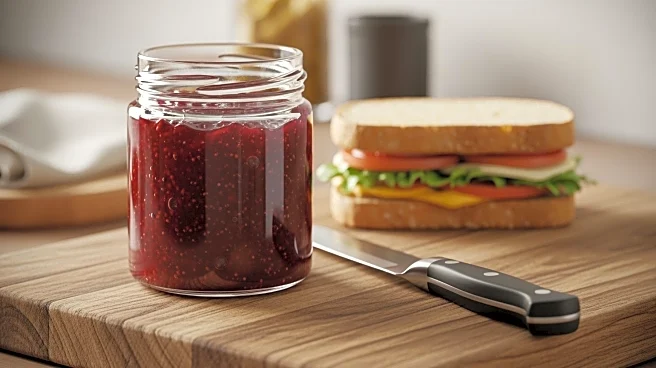What's Happening?
The J.M. Smucker Co. has initiated legal proceedings against Trader Joe's, claiming that the grocery chain's new frozen peanut butter and jelly sandwiches closely resemble Smucker's Uncrustables in design
and packaging. Filed in federal court in Ohio, the lawsuit alleges that Trader Joe's sandwiches mimic the round, crustless design and pie-like crimp markings of Uncrustables, infringing on Smucker's trademarks. Additionally, Smucker argues that the blue color used on Trader Joe's packaging is similar to that of Uncrustables, further violating trademark rights. Smucker is seeking restitution and demands that Trader Joe's deliver all infringing products and packaging for destruction. The lawsuit highlights Smucker's investment of over $1 billion in developing the Uncrustables brand over two decades, emphasizing the importance of protecting its intellectual property.
Why It's Important?
This legal action underscores the significance of trademark protection in the food industry, where product design and packaging are crucial for brand identity. Smucker's lawsuit against Trader Joe's reflects the company's commitment to safeguarding its established brand, which has been developed over many years with substantial financial investment. The outcome of this case could set a precedent for how similar trademark disputes are handled, potentially impacting other companies that produce similar products. If Smucker succeeds, it may deter other businesses from creating products that closely resemble established brands, thereby influencing market competition and consumer choices.
What's Next?
The lawsuit may lead to a settlement, as trademark cases often do, to avoid the costs of a trial. Trader Joe's could argue that the crimping design is functional and not trademarkable, or that their sandwiches differ in shape from Uncrustables. The court's decision will be pivotal in determining the extent of trademark protection for product designs. Additionally, the case may prompt other companies to review their product designs to ensure they do not infringe on existing trademarks, potentially leading to changes in packaging and marketing strategies.
Beyond the Headlines
The case highlights the broader issue of intellectual property rights in the food industry, where design and packaging play a significant role in consumer perception and brand loyalty. It raises questions about the balance between innovation and imitation, and the ethical considerations of protecting creative designs. The lawsuit also reflects the competitive nature of the food market, where companies must navigate complex legal landscapes to maintain their market position.









